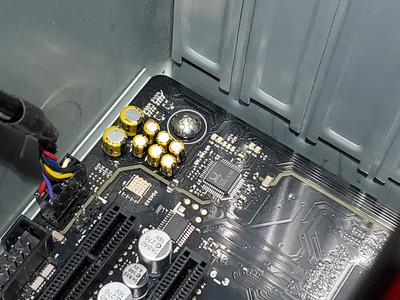First post, by Kahenraz
- Rank
- l33t
I started using onboard sound cards years ago once they had become "good enough". I just recently upgraded to an ASUS WS C246 PRO, which produces some terrible electrical noise from the onboard Realtek sound card, despite it having high quality capacitors and being isolated from the rest of the board. I dug around in my parts pin and managed to find my old Creative Sound Blaster X-Fi Titanium PCIe from years ago; it's dated 2007 on the board. This eliminated the noise and sounds great.
Is there any reason to get a more recent PCIe sound card for Windows 10? This one seems to work just fine. I know that there are external DACs, but I'm only interested in something that I can hide away inside of my case, instead of putting a box on my desk.
Here is the Realtek audio section of my motherboard. It looks well isolated. I wonder why I'm getting electrical noise from it.
